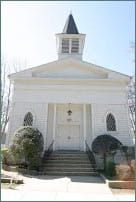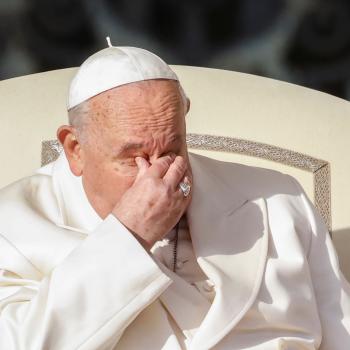By Kara Root
 I did not grow up Presbyterian. In fact, I have no recollection of ever having met a Presbyterian until I was in seminary, where there were so many of them I immediately vowed NOT to become one. In my world people were either some form of Baptist (which is how we categorized ourselves), or they were Lutheran or Catholic - everyone else was considered non-Christian or miscellaneous (which was a polite way to say "probably non-Christian").
I did not grow up Presbyterian. In fact, I have no recollection of ever having met a Presbyterian until I was in seminary, where there were so many of them I immediately vowed NOT to become one. In my world people were either some form of Baptist (which is how we categorized ourselves), or they were Lutheran or Catholic - everyone else was considered non-Christian or miscellaneous (which was a polite way to say "probably non-Christian").
I grew up a Midwestern Suburban Megachurch Evangelical. Our modest Christian Missionary Alliance congregation grew from 250 or so when I was in preschool to a whopping 8000 attendees by the time I graduated high school. Church was about youth group, Vacation Bible School, short term mission trips, bible studies, youth conferences and being a pastor's kid in a place that went from two pastors to a dozen or so in my childhood. "Worship" referred only to the singing part of the service, which, after announcements, was split pretty much evenly between a sermon and songs, with about 40 minutes for each. As a PK I saw all the ins and outs of church politics and watched some people and practices fall through the cracks as the leadership struggled to get ahead of the massive growth and continue to minister as faithfully as possible. But mostly it was a great experience - God was an active part of my life and central to my identity.
I spent time traveling and had experienced church in many countries and forms before college, but my exposure to the mainline remained limited. In my small Baptist college, "Calvin" was a four letter word, synonymous with "double-predestination", and while I still hadn't met a Presbyterian, I knew I was an Arminian and NOT a Calvinist (i.e., I believed in free will and not predestination!). I attended a Methodist church off and on during college, and liked some of what they did in worship, but was mostly drawn by its urban, diverse feel and a great Sunday school class. Beyond that, I didn't really understand the difference between or need for denominations
The first time I heard the Apostle's Creed was in seminary. I arrived in southern CA with a suitcase, class schedule, roommate and few other connections, and began a journey of exploration into what "church" really was. I spent the first 18 months or so visiting every different kind of church I could: United Church of Christ, Evangelical Free, Catholic, Mennonite, Episcopalian, Methodist, Covenant and Presbyterian. I loved the Catholics' Stations of the Cross and Ash Wednesday service, the Mennonite's practical social activism and simple sharing, the Episcopalians had my favorite services for Christmas Eve and Easter. I experienced the power of liturgy, bond of community, different expressions of the sacrament of communion, and worship as more than just singing and a sermon. I shared more deeply in a few congregations and my definition of "church" stretched and grew and flourished.
As graduation approached, I was faced with a dilemma. What denomination would I choose?
I went into the denominational studies office of my ecumenical seminary and flipped open the three ring binder of one page summaries, a kind of "Cliffs Notes" on each denomination. I immediately eliminated all those that did not ordain women. By this point in my journey my criteria had begun forming itself.
- I wanted a denomination that had a polity with connection and accountability
A hierarchical polity would not work for me, but with a congregational polity I had seen too many maverick, cowboy pastors with dynamic up front presences and little accountability. And I had lived through enough personal trauma with the church that could have been prevented, or at least greatly reduced, if pastors had more oversight, and churches supported one another instead of figuring out on their own how to deal with conflict and leadership problems. I liked leadership shared with elders and deacons elected by the congregation, and the idea that the discernment of God's will may happen better in committees than by individuals. (In other words - bring on the decently and in order!)
- I wanted a denomination that was going to make me work for ordination ... I wanted to be second-guessed and challenged along the way.
My childhood church and own family had suffered some recent great losses and deep pain publicly, my somewhat well-known ministry father had a "fall from grace" and my strong Christian family had crumbled around me. To say I was hesitant about ministry at that point would be putting it mildly. But there was still this sense of calling to contend with, so I needed it to be affirmed and tested in a communal process, (no internet ordination for me!) If I were going to go into this whole mess called the "Church" in a formal way, I wanted a denomination that held me accountable. I wanted lots of steps and lots of work - a process with stages and safeguards, and people involved with feedback and opinions all along the way. I had lost all illusions that individuals could go at it alone, or should. (In other words - I was pumped about the Book of Order!)




